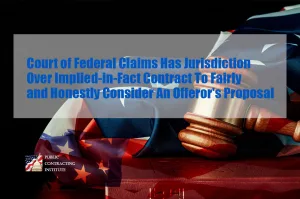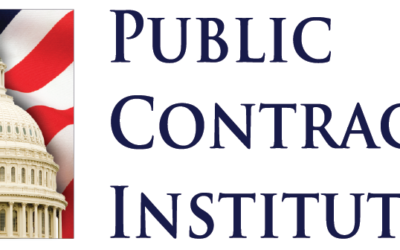The Federal Circuit recently held that the Court of Federal Claims has jurisdiction over a claim that the government breached an implied-in-fact contract to fairly and honestly consider an offeror’s proposal in the procurement context.

This was a question that had received conflicting answers from different Claims Court Judges. The Federal Circuit concluded that the Claims Court possesses such jurisdiction under 28 USC § 1491(b)(1), thereby making the issue reviewable under the Administrative Procedure Act. Safeguard Base Operations, LLC v. United States, B&O Joint Venture, LLC, No. 2019-2261 (Fed Cir. March 4, 2021). The procurement in Safeguard was for dorm management services at the Federal Law Enforcement Training Center in Georgia. Safeguard submitted three protests to the Government Accountability Office (“GAO”), the first two of which resulted in corrective actions (no GAO decision), and the last protest resulted in GAO denial of Safeguard’s protest. Safeguard then took its case to the Court of Federal Claims (“COFC”), where it alleged that the government had arbitrarily and capriciously disqualified Safeguard’s proposal and violated an implied contract to fairly and honestly consider the proposal. There were four basic reasons why Safeguard believed it had not been treated fairly and honestly:
- Safeguard omitted certain pricing information from its pricing proposal, although this information was allegedly not required
- The agency improperly interpreted the solicitation by believing that it could eliminate offerors from consideration from failing to include those pricing amounts
- Safeguard’s omission of those amounts were material and could not be waived or been resolved through clarifications
- Safeguard allegedly had a right to supplement the administrative record by including certain affidavits
First the Court reviewed the COFC’s jurisdiction, and concluded that it had jurisdiction under 28 USC § 1491(b)(1) to review the implied contract to fairly and honestly consider an offeror’s proposal.
Further, the standard of review would be the same as the Administrative Procedure Act “by which an agency decision is to be set aside only if it is arbitrary, capricious an abuse of discretion or otherwise not in accordance with law.” Second, the Court considered the four errors alleged by Safeguard, and concluded that the COFC did not err on the merits. Specifically:
- Safeguard’s proposal left out Solicitation-required amounts in its proposal
- The Solicitation provided notice that an offeror’s proposal could be eliminated from consideration by failing to include the required pricing information.
- The omissions of the pricing information were material and were not subject to waiver or correction through clarifications.
- The COFC did not abuse its discretion by denying Safeguard’s request to supplement the record with affidavits. These affidavits were not necessary for effective judicial review.
The Federal Circuit affirmed the final judgment of the COFC.
Takeaway. The Court of Federal Claims has jurisdiction over a claim that the government breached an implied-in-fact contract to fairly and honestly consider an offeror’s proposal in the procurement context. This resolves conflicting answers from different Claims Court Judges. The COFC possesses such jurisdiction under 28 USC § 1491(b)(1), thereby making the issue reviewable under the Administrative Procedure Act and its deferential standard of review. For other helpful suggestions on government contracting, visit: Richard D. Lieberman’s FAR Consulting & Training at https://www.richarddlieberman.com/, and Mistakes in Government Contracting at https://richarddlieberman.wixsite.com/mistakes.
Learn more about quality Proposal Drafting by taking a look at these articles by PCI:
- What is Red Team Review?
- Unsolicited Proposals
- Incomplete Proposal is not a Matter of Responsibility
- Must Your Proposal State Your Intent To Comply With Every Performance Work Statement Section?
- Must an Agency Permit Price Changes in Final Proposal Revisions?
- Court of Federal Claims Has Jurisdiction Over Implied-in-fact Contract to Fairly and Honestly Consider an Offeror’s Proposal
- Agency Failed to Follow Solicitation Requirement by Excluding Parts of Proposal



